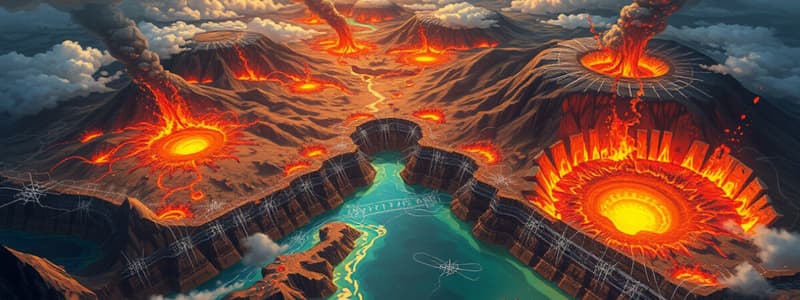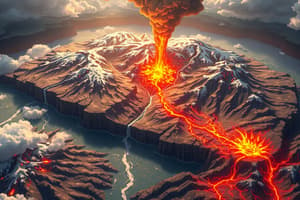Podcast
Questions and Answers
How many different plates are clearly shown on the map?
How many different plates are clearly shown on the map?
4
How many of the plates on the map consist entirely of ocean floor (or ocean floor with islands)?
How many of the plates on the map consist entirely of ocean floor (or ocean floor with islands)?
2
What type of plate boundary is indicated on the map as '#2'?
What type of plate boundary is indicated on the map as '#2'?
Divergent
What evidence indicates that a divergent boundary is present?
What evidence indicates that a divergent boundary is present?
What type of plate boundary is indicated on the map as '#3'?
What type of plate boundary is indicated on the map as '#3'?
What evidence indicates the presence of an ocean-continent convergent boundary?
What evidence indicates the presence of an ocean-continent convergent boundary?
What type of plate boundary is indicated on the map as '#4'?
What type of plate boundary is indicated on the map as '#4'?
What evidence indicates the presence of an ocean-ocean convergent boundary?
What evidence indicates the presence of an ocean-ocean convergent boundary?
What has been the approximate rate of movement of the Pacific Plate in the area of the Hawaiian Islands over the last 5.1 million years?
What has been the approximate rate of movement of the Pacific Plate in the area of the Hawaiian Islands over the last 5.1 million years?
Estimate the age of volcanic rocks you would expect to find on Midway Island using the average rate of plate movement?
Estimate the age of volcanic rocks you would expect to find on Midway Island using the average rate of plate movement?
Flashcards are hidden until you start studying
Study Notes
Plate Boundaries and Types
- A total of 4 distinct tectonic plates identified on the provided map.
- 2 of these plates consist entirely of ocean floor or include ocean floor with islands.
- Mid-ocean ridge location indicates a divergent plate boundary with evidence showing that the age of the ocean floor increases away from a band of shallow earthquakes.
Convergent Plate Boundaries
- The major volcanic mountain range (labeled as "#3") represents an ocean-continent convergent boundary, evidenced by shallow to deep-focus earthquakes and the presence of volcanoes.
- The volcanic island arc (labeled as "#4") indicates an ocean-ocean convergent boundary, signified by shallow to deep-focus earthquakes and volcanic islands.
Pacific Plate Movement
- The average movement rate of the Pacific Plate near the Hawaiian Islands has been calculated at approximately 110 millimeters per year over the last 5.1 million years.
Estimating Age of Volcanic Rocks
- Midway Island, part of the Hawaiian chain and produced by the same hot spot as Kilauea, is 2430 kilometers (1510 miles) from the volcano.
- Using the calculated plate movement rate, the estimated age of volcanic rocks on Midway Island is around 22 million years.
Studying That Suits You
Use AI to generate personalized quizzes and flashcards to suit your learning preferences.



